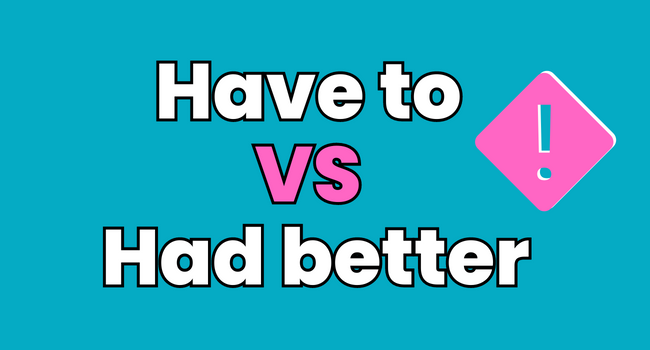
“Have to” and “had better” are similar expressions, but they have distinct meanings and uses. They are both semi-modal verbs. “Had better” is typically used for giving strong advice with a hint of potential negative consequences if not followed. However, “have to” refers to obligations or rules without necessarily suggesting any specific danger or consequence.
Examples of Use
- “Have to”: You have to go to school tomorrow. This implies an obligation. It’s necessary that you go.
- “Had better”: You had better go to school tomorrow. This suggests potential negative outcomes if you don’t go, such as a teacher or your mother becoming upset.
Another example:
- “Have to”: David has to fill up the gas tank before he leaves. This indicates that it’s David’s obligation to put gas in his car before he leaves.
- “Had better”: David had better fill up the gas tank before he leaves. This implies a possible problem if he doesn’t, like the car running out of gas.
Using “Have to”
“Have to” is used when something is necessary or required, much like a rule or obligation. Yet, it’s not as strong as “must”. “Have to” is a semi-modal verb that is followed by a base verb, the infinitive without “to”.
Conjugation of “Have to”
| Subject | Conjugation |
|---|---|
| I | have to |
| You | have to |
| He/She/It | has to |
| We | have to |
| They | have to |
Example: Today, I have to go to the grocery store. Yesterday, I had to go to the bank.
Using “Had better”
“Had better” is used to express strong recommendations or advice. This phrase suggests that something must be done, and there may be negative consequences or even danger if it doesn’t. Like “have to”, “had better” is also a semi-modal verb and is followed by the bare infinitive without “to”.
Conjugation of “Had better”
| Subject | Conjugation |
|---|---|
| I | had better |
| You | had better |
| He/She/It | had better |
| We | had better |
| They | had better |
Note: We do not say “have better” or “has better”. It is always “had better”.
Negative and Interrogative Forms
Both “have to” and “had better” have different negative and interrogative forms. Let’s go through each one:
“Have to”
Affirmative: You have to complete the project.
Negative: You don’t have to finish it today. He doesn’t have to finish it today.
Interrogative: Do I have to attend the meeting? Does she have to go to the appointment?
“Had better”
Affirmative: You had better tell him the truth. For the contraction, we use “You’d better” or “He’d better”.
Negative: The negative form of “had better” is “had better not”. Example: You had better not miss the train.
Interrogative: Although not common, the interrogative form would be correct as: “Had I better help Joel in the kitchen?”
Quick Quiz
Let’s see how well you’ve grasped the topic with a quick quiz. The task is to check whether the following eight sentences are grammatically correct:
- He has to finish this report before the meeting.
- You don’t have to clean the dishes. I’ll take care of it.
- She has better pay her electricity bill before the power gets cut.
- Do I had to bring anything to the party tomorrow?
- He’d better do his homework before Mom comes home.
- I had to work overtime last night to meet the deadline.
- You had not better lose your keys.
- We had better get a taxi. It’s going to start raining soon.
You can check your answers by watching my YouTube video about have to vs. had better above!

Leave a Reply